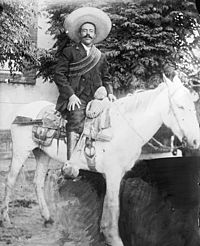Francisco "Pancho" Villa
| Francisco "Pancho" Villa | |
|---|---|

Pancho Villa
|
|
| Birth name | José Doroteo Arango Arámbula |
| Nickname(s) | Francisco Villa Pancho Villa El Centauro del Norte (The Centaur of the North) |
| Born |
5 June 1878 La Coyotada, San Juan del Río, Durango, Mexico |
| Died | 20 July 1923 (aged 45) Parral, Chihuahua, Mexico |
| Buried | Parral, Chihuahua, 1923; reburied 1976 Monument to the Revolution, Mexico City |
| Allegiance | Mexico (antireeleccionista revolutionary forces) |
| Rank | General |
| Commands held | División del Norte |
| Battles/wars |
|
| Spouse(s) | María Luz Corral, church marriage 1911. |
| Signature | |
| Governor of Chihuahua | |
|
In office 1913–1914 |
|
| Preceded by | Salvador R. Mercado |
| Succeeded by | Manuel Chao |
Francisco "Pancho" Villa (born José Doroteo Arango Arámbula; 5 June 1878 – 20 July 1923) was a Mexican Revolutionary general and one of the most prominent figures of the Mexican Revolution.
As commander of the División del Norte (Division of the North) in the Constitutionalist Army, he was a military-landowner (caudillo) of the northern Mexican state of Chihuahua. Given the area's size and mineral wealth, it provided him with extensive resources. Villa was also provisional Governor of Chihuahua in 1913 and 1914. Villa can be credited with decisive military victories leading to the ousting of Victoriano Huerta from the presidency in July 1914. Villa then fought his erstwhile leader in the coalition against Huerta, "First Chief" of the Constitutionalists Venustiano Carranza. Villa was in alliance with southern revolutionary Emiliano Zapata, who remained fighting in his own region of Morelos. The two revolutionary generals briefly came together to take Mexico City after Carranza's forces retreated from it. Later, Villa's heretofore undefeated División del Norte engaged the military forces of Carranza under Carrancista general Álvaro Obregón and was defeated in the 1915 Battle of Celaya. Villa was again defeated by Carranza, 1 November 1915, at the Second Battle of Agua Prieta 1 November 1915, after which Villa's army collapsed as a significant military force.
Villa subsequently led a hit and run raid against the small U.S.-Mexican border town in the Battle of Columbus 9 March 1916 and then fled in fear of USA retaliation. The U.S. government sent U.S. Army General John J. Pershing to capture Villa who continued to run and hide in an unsuccessful nine-month incursion into Mexican sovereign territory (Pancho Villa Expedition) that ended when the United States entered World War I and Pershing was recalled.
...
Wikipedia
